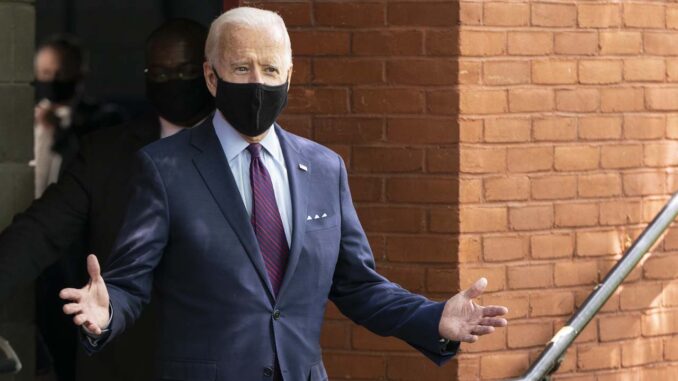
Today, the United States will inaugurate its new president, Joe Biden and his Vice, Ms Kamala Harris. The world would stand by and watch the beacon of the liberal democracy renew itself. The inauguration is coming against the backdrop of the invasion of the Capitol Hill by an aggrieved section of the population that didn’t accept the verdict of the electoral process. The event shocked many Americans who had hitherto watched raging battles between the people and some tin-pot despots in the developing world as footnotes on their television screens. So, ahead of the inauguration, the American security architecture is in full swing and to prevent any outburst of the simmering anger in ways that could disrupt the inauguration of Biden as its 46th president.
The mass of unruly protesters, obviously inflamed by the speeches of the incumbent but out-going president, Donald Trump had on January 6, 2021 invaded the hallowed chambers of the Senate in a bid to truncate its session to ratify the Electoral College’s votes confirming Joe Biden as the new president. Despite a clear majority of 81, 283, 485 American votes (representing 51.4 per cent of total votes cast) polled by Biden, against Trump’s 74, 223, 485 or 45.9 per cent, Trump had insisted that his opponent stole his mandate. Trump was not convinced even when the Electoral College gave Biden an overwhelming 306 votes to Trump’s 232. He had consequently made several inciting comments, which encouraged his supporters to breach security of the seat of power and invaded the sacred hall of its governmentality. In the process, about five lives including those of security personnel suing for peace were lost.
It should be noted, however, that in a democracy, accountability takes place through both vertical and horizontal levels, that is, between institutions of state and through the periodic electoral process when people vote in or vote out their representatives in a power audit. People’s upspring is not unusual in a democracy; power resides in the former; in other words, they are the repository of power while the representatives are the interim wielders of their mandate. Protests are the means of expression in a democracy. Democracy itself is the festival of the people; it is the associational zeitgeist that De Tocqueville discovered in his visit to America in the 19th century.
What matters when democratic storms happen is the manner in which it is handled by the state. The American state handled the protest in the most civilized manners, and did not kill innocent citizens: they recognised that the people are the boss even when a sitting president was central to the uproar. In fact, it could be said on an admirable note that the American institutions rose to the occasion and restored peace to the troubled capital in ways friendly to the people. The opposite would have happened in climes where military generals would have vowed to carry out only the president’s order even when the president is seeking to exercise such powers against the organic laws of the land.
The lesson should not be missed that the U.S. elections held in a setting in which all the political and social forces were mobilised along partisan lines amidst a health emergency that has so far claimed numerous American lives. The COVID-19 pandemic and its management became the crux of the electoral contest and was marshalled either way to delegitimise the incumbent or underline the incapacity of the challenger. It increased the political tension, not unexpectedly considering the pandemic’s massive devastation. Of the almost 96 million cases and more than two million deaths globally, the U.S. accounts for 24 million cases and almost 400,000 deaths. As it is almost the case in such situations, electoral outcome was bound to be contested. The incumbent alleged violation of the electoral rules in some states of the American federation and the judicial review process affirmed the electoral process as free and fair and that the incumbent’s allegations were baseless.
In a rule-governed country, judicial pronouncements ought to be final and faith is to be reposed in the impartial institutions of the state for the preservation of the republic. But the incumbent inflamed his teeming supporters to take laws into their hands and the invasion of the Capitol happened. A miffed Congress engrossed an article of impeachment and began a bipartisan and second impeachment process to remove from office President Donald Trump in place of the non-invocation of the 25th amendment that allows for the removal of the president based on his or her incapacity to do his/her job. The impeachment had gone through the House of Representatives and yet to be complemented by the Senate. Whatever could be said about the democratic storm in the U.S., one point stands out, namely, the triumph of democratic institutions and the affirmation of faith in them by key state actors. It brought out the statesmanship of its leaders and their abiding faith in their country.
It needs to be said that today’s inauguration has implication for the democratic community. Internally, Biden would need to heal what observers have called the toxic political climate and unite all Americans. Internationally, many countries have always looked up to the U.S. to lead the liberal democratic pack through its liberal internationalism policy, by expanding the liberal zone of peace, and checkmating authoritarianism and extremism in whatever forms. That community of democrats wants to see the promotion of democracy and U.S. role in the maintenance of global peace and security. In this part, Nigerians look up to the U.S. to reinforce its democratic institutions and lend a hand in ending the expanding circle of undemocraticness and extremism in our country.


Be the first to comment